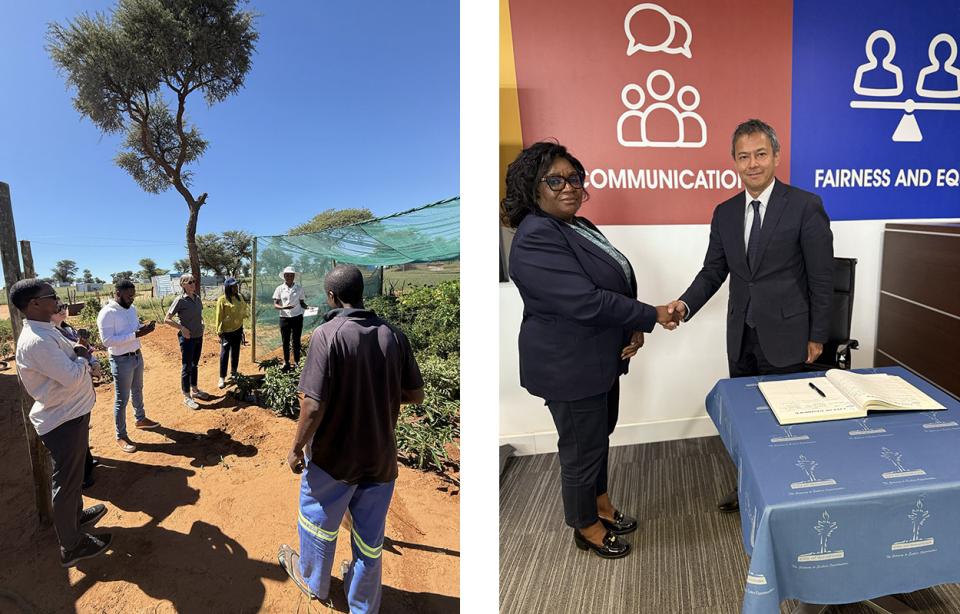UNITAC-Hamburg strengthens partnerships and advances digital solutions during Namibia mission
This fourth mission of UNITAC-Hamburg to Namibia aimed to engage with key stakeholders, deepen strategic partnerships, deliver capacity-building activities, and advance the ongoing development of the digital solutions for climate resilience.
Namibia’s towns and settlements are increasingly exposed to the impacts of droughts, floods, and other climate-related conditions. Towns have the responsibility to deliver basic services and respond quickly to emergencies, such as ensuring access to clean water, repairing damaged roads, or managing vulnerable infrastructure like bridges. In this context, being resilient means not only preparing for climate disasters but also maintaining essential services that communities depend on. UNITAC’s work supports these efforts by introducing digital solutions and data platforms that help local authorities collect and manage data more efficiently, improving service delivery and enabling faster, more informed responses during emergencies.

Photo: Aerial image of Opuwo, Namibia. Photo credit: Kris Barnard
Carried out within the framework of the project Just Transitions in Vulnerable Places – Digital Solutions for More Climate Resilient Informal Areas in Namibia, funded by the German Federal Ministry for Economic Cooperation and Development (BMZ), the mission supports the engagement of national, sub-national, and local government efforts to strengthen resilience in informal settlements. The project aims to equip decision-makers with the tools and knowledge needed to manage urban challenges and adapt to growing climate risks, while improving living conditions in vulnerable communities.
The delegation presented the latest developments under the Just Transitions project, generating strong interest from stakeholders and partners in UNITAC’s digital tools portfolio.
Discussions reaffirmed the strong alignment between UNITAC’s activities and the priorities of Namibia’s new government, particularly regarding land, adequate housing, and basic services. These areas correspond directly with UN-Habitat’s recently adopted Strategic Plan 2026-2029, which places a renewed emphasis on the transformation of informal settlements and slums for more inclusive, climate-resilient, and sustainable cities.
On the ground, the team observed notable progress by the government in advancing innovative housing and data solutions. This includes the development of a national housing information system. This centralized housing database aims to improve transparency, monitoring, reporting and evidence-based urban planning. It is designed to identify housing stock including individual dwellings and helps to accelerate the response to housing and land needs. These efforts reflect a strong commitment to upgrading informal settlements and expanding access to adequate housing. The close synergy between Namibia’s national priorities with strategic global frameworks and UNITAC’s mission opens new opportunities for collaboration.
During the visit, the UNITAC delegation engaged with various national and local authorities, including the City of Windhoek, and visited different project sites. A key outcome of the mission was the formal agreement between UN-Habitat and the City of Windhoek to collaborate on the development of the city’s Smart City Strategy and SDG localization, with UN-Habitat providing technical and advisory support throughout the process.

Photo left: Visit to Rehoboth (Rooidyne Informal Settlement). Photo right: Ndeshihafela Larandja (Mayor of Windhoek) and Masayuki Yokota (Head of the UN-Habitat Sub-Regional Office for Southern Africa)
The mission featured several capacity-building activities, including Climate Vulnerability Assessment (CVA) workshops in Helao Nafidi and Opuwo. The trainings brought together local town representatives to strengthen knowledge on climate vulnerability methodologies, identify data gaps, understand capacities and support the development of local action plans for building resilience in informal settlements.

Photo: Climate Vulnerability Assessment workshop in Opuwo. Photo credit: Kris Barnard
In addition, UNITAC organized Digital Job Card training and user testing sessions in Rehoboth, Helao Nafidi and Opuwo, working directly with municipal representatives to refine the tool’s practical application for improved service delivery and infrastructure management.

Photos: User testing session in Opuwo
The mission further created opportunities to strengthen partnerships with financial institutions, academia, and development agencies to mobilize broader support for Namibia’s urban resilience agenda.

Photo from left: Dennis Mwaniki (Statistician, UN-Habitat), Tuwilika Shaimemanya (Associate Programme Management Officer, Partnerships, UN-Habitat), Aline Matta (Head of UNITAC), Abdinassir Sagar (Programme Management Officer, UN-Habitat) at Namibian University of Science and Technology (NUST)
During the mission, UNITAC engaged with government stakeholders, reaffirming its commitment to collaboration across multiple levels. The visit emphasised the value of practical, scalable digital tools and data in strengthening basic service delivery, boosting climate resilience, and improving the daily lives of residents in vulnerable communities.
Publishing date: 26 June 2025
Author: Eva Stowasser


